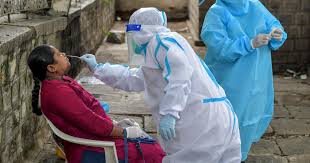Chinese scientists claim COVID-19 originated in India, due to contaminated water
By Lokmat English Desk | Published: November 28, 2020 05:11 PM2020-11-28T17:11:15+5:302020-11-28T17:14:06+5:30
Chinese researchers have claimed that coronavirus originated in India, in the latest attempt by academics to pin blame for ...

Chinese scientists claim COVID-19 originated in India, due to contaminated water
Chinese researchers have claimed that coronavirus originated in India, in the latest attempt by academics to pin blame for the pandemic outside their borders. A team from the Chinese Academy of Sciences argues the virus likely originated in India in summer 2019 - jumping from animals to humans via contaminated water - before travelling unnoticed to Wuhan, where it was first detected. It is not the first time that Chinese authorities have pointed the finger of blame elsewhere - suggesting, largely without evidence, that both Italy and the US could be the site of the original infection. The latest allegations comes on the backdrop of increased political tensions between India and China, with troops attacking each-other along a disputed border.
The WHO is currently looking for the source of coronavirus in China, while the body of scientific evidence suggests the disease originated there. In their paper, the Chinese team use phylogenetic analysis - a study of how a virus mutates - to attempt to trace the origins of Covid-19.The scientists argue that it should therefore be possible to track down the original version of the virus by finding the sample with the fewest mutations.They say that using this method rules out the virus found in Wuhan as the 'original' virus, and instead points to eight other countries: Bangladesh, the USA, Greece, Australia, India, Italy, Czech Republic, Russia or Serbia.
Researchers go on to argue that because India and Bangladesh both recorded samples with low mutations and are geographic neighbours, it is likely that the first transmission occurred there.By estimating the amount of time it takes for the virus to mutate once, and comparing that to the samples taken there, they also theorise that the virus first emerged there in July or August 2019. They go on to say: 'From May to June 2019, the second longest recorded heat wave had rampaged in northern-central India and Pakistan, which created a serious water crisis in this region. 'The water shortage made wild animals such as monkeys engage in the deadly fight over water among each other and would have surely increased the chance of human-wild animal interactions.
'We speculated that the [animal to human] transmission of SARS-CoV-2 might be associated with this unusual heat wave. 'Researchers further argue that India's poor healthcare system and young population - who suffer less severe symptoms of Covid - allowed the virus to spread undetected for several months. They speculate that the virus could have spread to the other countries on their list before coming to China, possibly via Europe. 'In this regard, the COVID-19 pandemic is inevitable and the Wuhan epidemic is only a part of it,' they conclude.
However, other researchers were not impressed with the findings.Coroanvirus first emerged in China in December 2019, linked to a cluster of cases of 'pneumonia of unknown origin' at a seafood market in the city. It then spread across China before making its way to other countires, mostly via toursits, where it spread rapidly and caused a pandemic. However, nobody has been able to identify 'patient zero' the first person known to have caught the disease, which means we do not known when or where exactly the first infection occurred. The World Health Organisation, under pressure because of its own response to the pandemic, has sent a 10-person team to China to investigate. While the team admit it is possible that the virus originated outside of the country, their initial searches are all focused within China's borders. The UN agency has tried to temper expectations ahead of the investigation, warning that tracking any new pathogen is a 'riddle that can take years to solve'.
Open in app